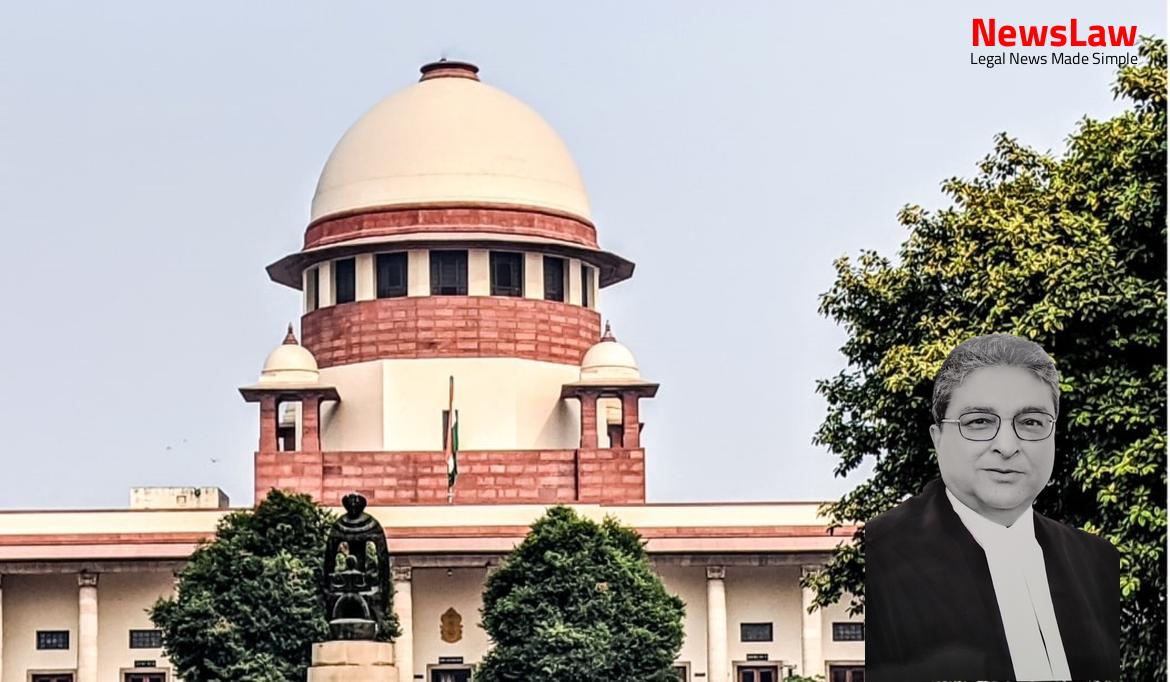Delve into a comprehensive analysis of the court’s legal examination regarding the enforceability of foreign arbitration awards. Explore the nuances of public policy considerations, contractual disputes, and the implications of government restrictions on export. Gain insights into the interpretation of legal frameworks in international agreements and the role of arbitration tribunals within the justice system.
Facts
- NAFED filed objections to the enforceability of the award on the ground of public policy opposition.
- The High Court of Delhi provided an interim stay order on 20.3.1981, which NAFED claims was disregarded by FOSFA.
- NAFED was not allowed to appoint its arbitrator despite the court’s order and was not represented by its counsel.
- Alimenta S.A. filed various petitions and appeals in response to the proceedings initiated by NAFED.
- The Government of India rejected NAFED’s request for export against the previous year’s contract.
- NAFED raised objections to the arbitration proceedings and the appointment of arbitrators made by FOSFA.
- Ultimately, FOSFA passed an award against NAFED for a sum of USD 4,681,000 as damages.
- NAFED’s review was dismissed on 5.5.2000 and execution was barred by limitation.
- The High Court decided against NAFED on 28.1.2000 after 20 months of delay, deeming the award enforceable.
- On 5.4.2002, this Court modified the High Court’s interim order and disposed of Alimenta S.A.’s petitions.
- The appeal should have been filed within 30 days due to Article 119 of the Limitation Act, 1963.
- High Court entertained the matter on 28.2.2001 and stayed execution.
- This Court upheld the High Court’s decision on 9.1.1987.
- The arbitrator-nominee of Alimenta S.A. represented the case before the Board of Appeal, resulting in an unfair award and illegal enhancement of interest.
- On 14.9.1990, the Board of Appeal compounded NAFED’s issues by enhancing the award without any appeal from Alimenta S.A.
- NAFED was directed to pay interest at a higher rate of 11.25% instead of 10.5% as originally decided.
- The interim order and appointment order were challenged in this Court.
Also Read: Preservation of Fundamental Rights in Education
Issue
- Main objections for enforcing the award: NAFED’s ability to comply with the export obligation due to Government’s refusal, liability for breach of contract and damages, and public policy considerations.
- Contract between NAFED and Alimenta S.A. for supply of 5,000 metric tonnes of Indian HPS groundnut.
- Clause 11 of the contract referring to FOSFA, 20 Contract, a standard CIF contract.
- The contract was not a Free on Board (FOB) contract.
- NAFED acting as a canalizing agency for the Government for commodity exports.
- Issue at hand is the enforceability of the foreign award.
Also Read: Legal Analysis on Shareholding and Nomination Rights
Arguments
- The learned Single Judge could not have converted the award into a decree.
- The decision is contrary to the public policy of India as laid down in various decisions.
- Argument based on clause 1 of the Import Trade Control Order No 2-ITC/48, dated March 6, 1948 allowing the appellant to apply for permission to sell chicory.
- Mr. A.G Scott, the Arbitrator, delivered the award and later appeared as a counsel for Alimenta S.A.
- Argument by learned senior counsel that enforcement of the award is barred by section 7(1)(a)(ii) of the Foreign Awards Act.
- Claim that NAFED was not given a fair opportunity to present its case before the Arbitral Tribunal.
- Award granting interest at 18 percent per annum and requiring NAFED to cover exchange deviation loss is contested.
- Argument that the award flouts basic norms of justice.
- Claim that the award is against public policy of India and thus unenforceable under section 7(1)(b) of the Foreign Awards Act.
- Claim that NAFED was not allowed legal representation during the arbitral proceedings.
- Contestation by the respondent that the contract was not impossible of performance, and appellant cannot invoke Section 56 of the Indian Contract Act.
- Argument that enforcement of the award would lead to unjust enrichment of Alimenta S.A. at the expense of NAFED’s survival.
- Claim that enforcement procedure is barred by limitation and not brought within 30 days as per the Limitation Act, 1963.
- NAFED was given the opportunity to present its case in arbitration
- There was no ban on export by the Government of India
- The Arbitral Tribunal considered the question of imposition of ban by the Government
- The conclusion was that it was a self-imposed restriction by NAFED
- Scope of interference in enforcement of foreign award is limited
- The award is not against public policy
Also Read: Legal Analysis of Change in Law Compensation in Power Purchase Agreements
Analysis
- The contract between NAFED and Alimenta S.A. for the season 1979-80, with a contracted quantity of 5000 metric tonnes, faced complications due to various reasons.
- NAFED was unable to fulfill some export contracts due to a drought, leading to a refusal by the Government to permit exports from previous years to be carried forward to the next year.
- The award issued in arbitration was found to be in conflict with public policy as it was induced by a fraudulent or corrupt means.
- Various legal and procedural aspects, including the appointment of arbitrators, permission requirements, and public policy considerations, influenced the outcome of the case.
- The Government’s restrictions on export, the unforeseen rise in commodity prices, and the need for explicit permissions from the Government played a significant role in the contractual disputes.
- The doctrine of frustration of contract and the implications of public policy were central to the arguments presented during the case.
- Foreign award enforcement and the interpretation of public policy within the context of international agreements were also key factors discussed in the judgement.
- The concept of public policy and its application to contractual agreements and arbitrations under Indian law were scrutinized in detail.
- Procedural irregularities and the role of arbitral tribunals within the legal framework were highlighted to determine the enforceability of awards.
- Section 32 deals with the enforcement of contracts contingent on an event happening, such as agreements to do impossible acts or acts later becoming impossible or unlawful.
- A foreign award may not be enforced under the Foreign Awards Act if it is contrary to public policy or the law of India.
- Prohibition by the government can render an award unenforceable if it is sufficient to contravene the provisions of the act.
- Section 7(1)(b)(ii) states that a foreign award may not be enforced if it is contrary to public policy.
- Clause 14 of the FOSFA contract details the provisions related to prohibition and impossibility of fulfillment due to government actions.
- The agreement in question involves a contingent contract where both parties were aware of potential government interventions as detailed in Clause 14.
- Section 56 of the Contract Act outlines liability for promisors in cases where promises are impossible or unlawful.
- Section 32 and Section 56 apply when contracts themselves provide for contingencies upon which the contract cannot be carried out.
- The contract becomes void in cases where the agreed-upon contingencies cannot be fulfilled.
- Illustrations provided demonstrate scenarios where contracts are dependent on specific future events, making enforcement conditional on those events.
- In cases of a frustrating event, the contract becomes impossible to perform.
- The doctrine of frustration is based on supervening impossibility or illegality according to Section 56 of the Indian Contract Act.
- The court enforces the agreement’s intent when performance becomes impracticable due to unexpected circumstances.
- Understanding the basics of frustration as per Indian law is imperative, and English law principles have persuasive value but are not binding.
- The court’s role in judicial review is limited in cases of foreign award enforcement, focusing on formal requirements rather than the merits of the award.
- The award is illegal and against public policy of India as it involved export without permission from the Government.
- The contract became unenforceable under section 32 of the Contract Act due to a contingency agreed by the parties.
- NAFED cannot be held liable to pay damages under the foreign award as it is unenforceable.
- The Arbitrator should have followed ethical standards and should not defend the arbitration award in subsequent judicial proceedings.
- The Board of Appeal was not authorized to increase the interest rate without an appeal, and hence, the issue is not decided in this case.
Decision
- The appeal filed by NAFED is allowed
- The impugned judgment and order passed by the High Court is set aside
Case Title: NATIONAL AGRICULTURAL COOPERATIVE MARKETING FEDERATION OF INDIA Vs. ALIMENTA S.A. (2020 INSC 345)
Case Number: C.A. No.-000667-000667 / 2012



